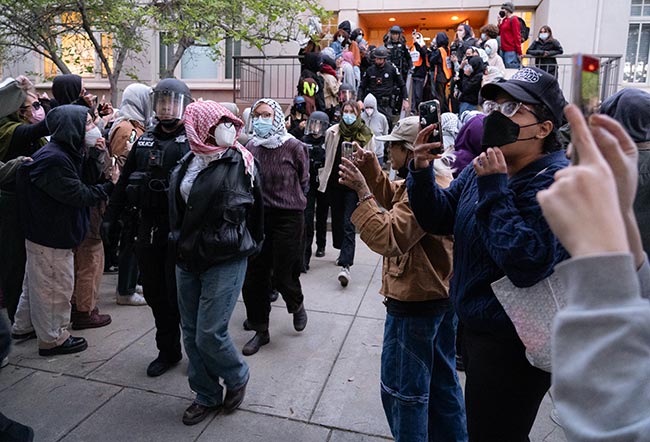Turns out, Claremont teens have quite a story to tell
For almost two hours last Thursday, one woman held a gymnasium full of middle school students transfixed with the unbelievable tale of how a group of teenagers changed their lives with the simple power of the written word.

The result was a collection of these students’ stories called “The Freedom Writers Diary” which became a number one best selling book and a movie starring Hilary Swank. The proceeds from the book paid for the students’ college educations and empowered them to change the course of their lives.
In the beginning, all she had was a room full of disenfranchised and disillusioned teens with three things in common: they did not like each other, school or their new English teacher.
She began Thursday’s talk by introducing some of those former students from room 203 who attended Long Beach’s Woodrow Wilson High School 1994. It was a year after the Los Angeles riots and an extremely violent time in the history of southern California. The students in Ms. Gruwell’s class were largely black and Hispanic, many were gang members and most had friends or family who had been murdered. During that year, 126 young people were killed in Long Beach, according to Ms. Gruwell. This was the environment that her students endured every day.
A student named Maria who showed up on the first day of class with a black eye and an ankle monitor wrote in an essay book: “ ‘I hate Erin and if I weren’t on probation I’d probably shank (stab) her.’ ” Another named Darius put it this way, “ ‘I feel like I come from an undeclared war.’ ”
“What would make a 14-year-old so angry that he would take gun and shoot randomly?” Ms. Gruwell asked rhetorically, “why have they already given up?” However, she was undeterred; perhaps because she saw that more than pity or handouts, they wanted a hand up.
To break through, Ms. Gruwell invented a game in which her students stood facing each other on either side of a line drawn down the center of the classroom, and then approached the line in response to various questions about their interests and their lives. At the end of the game, most of the students stood face to face on the line. The idea was to get them to recognize their shared struggle, living in poverty and violence, rather than viewing the world as a battleground they faced alone.
On Thursday she used a similar game to send a message of unity to the El Roble students. Through a series of increasingly probing questions, students were asked to stand if they had experienced some of the common stressful situations faced by teens. Among other queries, she asked if anyone had ever been bullied, or knew someone who abused drugs. Following many of the questions, a majority of students stood, enabling them, perhaps for the first time, to realize how common these situations are.
“The Freedom Writers Diary” began as anonymous journal entries about the everyday struggles faced by the students of room 203. Partly inspired by “Anne Frank: The Diary of a Young Girl,” they began to collect the stories and took the name from The Freedom Riders of the American civil rights movement.
The Freedom Writers, Ms. Gruwell’s original students who now work with her, describe the inspiration for the book on the official website as follows, “We discovered that writing is a powerful form of self expression that could help us deal with our past and move forward. Room 203 was like Anne’s attic… it was our safe haven, where we could cry, laugh, and share our stories without being judged.”
Ms. Gruwell’s visit to El Roble was prompted by a request from her niece Emma Cossey who is a seventh grader at the school. She told her story twice, first for the seventh grade and then for the eighth, but says that there is no script, “I change it a little bit each time I tell it,” and in that way she tailors it to each audience.
Following the talk, 14-year-old Alexandra Castro queued up with a dozen other students to get Ms. Gruwell’s autograph. “I know how it feels to have family in jail,” she said somewhat sheepishly, explaining that her brother was in prison. “I have never met him, because I was not born yet, but my dad said maybe we will go this year.”
Fellow student Alexis Rodriguez was inspired by the story. “You don’t find a teacher like that every day, who really cares and makes a difference,” she said as her friends nodded in agreement.
Following the success of “The Freedom Writers Diary,” Ms. Gruwell created the Freedom Writers Foundation, which trains educators around the world, particularly those who work in difficult teaching environments. The foundation also offers scholarships to first-generation high school graduates and stages seminar assemblies and professional development events through the Freedom Writers Outreach program.
—Steven Felschundneff
steven@claremont-courier.com








0 Comments